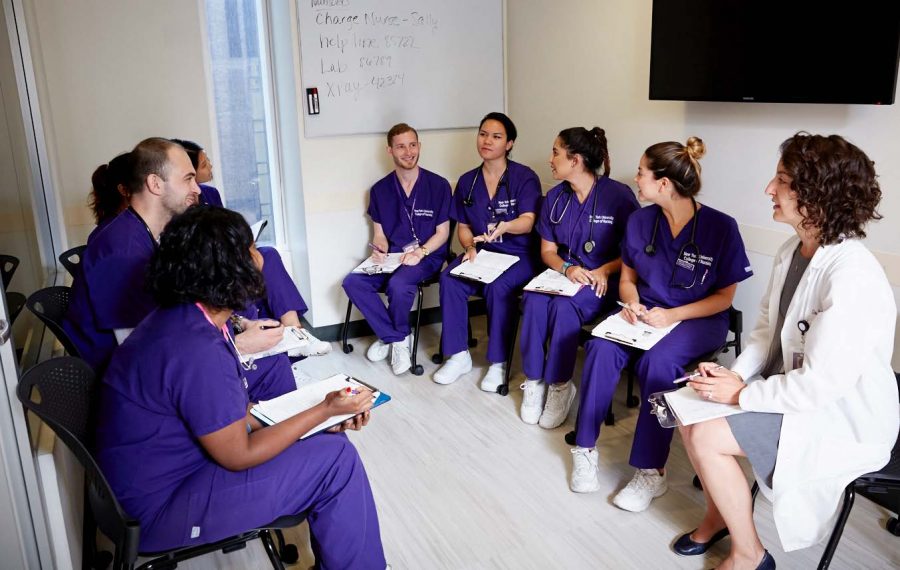Nursing Students Feel Neglected
NYU’s Rory Meyers College of Nursing ranked number ten on Nursing School Hub’s “Top 30 Cutting Edge Nursing Schools.”
November 27, 2017
Ranked number 10 on Nursing School Hub’s “Top 30 Cutting Edge Nursing Schools,” the Rory Meyers College of Nursing is one of NYU’s hidden gems.
Situated about 1.5 miles away from Washington Square Park on the 400 block of First Avenue, the globally renowned program lives in relative obscurity to students taking classes on Washington Square. While the nursing school is smaller than the Stern School of Business or the College of Arts and Science, the coursework and clinical experience required makes it arguably one of the most challenging tracks offered at the university.
Many nursing students feel like the strenuous nature of their academic and work life goes unrecognized by fellow students.
“Nursing offers so much more than what people think,” nursing senior Olivier Gaillard said. “It’s downplayed so much. People tell us, ‘Just go all the way and become a doctor,’ but we have to learn so much more than people think we do. We have to know the majority of the information about the patients.”
Nursing is more than just learning numbers and techniques — students say they are often taxed emotionally during hospital clinical simulations in which they learn bedside manner and communication skills by directly interacting with patients.
“People in general don’t consider nursing to be hard — they think it’s something anyone can do,” nursing senior Angie Rosario said. “But we’re basically pre-med in a very condensed overview — it’s a lot. You can teach anyone to do a finger-stick, but in terms of why and what it’s all about, it comes from lectures.”
Paired with the lack of respect for nursing as a profession, nursing students at Rory Meyers feel they receive less attention compared to students at other NYU schools.
“When the nursing school got named Rory Meyers last year, no one really talked about it,” nursing senior Arlette Espinosa said. “But I remember when [the Tandon School of Engineering] got its name a few years ago, it was made a really big deal.
According to Rory Meyers Dean Eileen Sullivan-Marx, however, the recognition given to nursing has improved since she started as dean in 2012.
“In the nursing world, we know NYU is one of the best,” Sullivan-Marx said. “When I arrived five years ago, I don’t think everyone knew that on campus. It’s not a large school, but it’s large for a nursing school. Now, I think nursing does get a lot of attention at NYU. We have students that serve on the University Senate and the Student Council. I’m vice chair of the Dean’s Council.”
As nursing students enter the final years of the program, they spend most of their time in the First Avenue building or the hospitals in which they do their clinicals, with little time to travel to main campus.
According to nursing students, this distance poses challenges and takes a lot of getting used to.
“We’re kind of isolated on First Avenue,” Gaillard said. “We don’t have classes on main campus and we don’t really get time to go visit people. It’s emotionally taxing. It may seem depressing for some, but after a while you get used to it. You grow, you adapt to it. ”
Some nursing students also complain of lack of access to Washington Square’s resources.
“My friend is in the accelerated nursing program,” Espinosa said. “She’s paying around $100,000 for a 15-month program and she doesn’t even know where Bobst or the bookstore are.”
But Sullivan-Marx says this detachment is not unique to NYU.
“I have been to many nursing schools over the course of my career,” she said. “Even when the buildings are right in the middle of campus, students in junior and senior year still feel like they are not part of the main campus because they’re so busy with nursing classes.”
A large part of what makes the lives of nursing students so intense is the combination of classes and pass/fail clinical simulations, which require students to work between eight and 16 hours at a hospital. Many students also take on part-time jobs outside of their school work.
The difficulty of coursework is amplified by the emphasis employers place on college GPA.
“Summer externships require a 3.5 GPA which is very limiting,” said a nursing student, who chose to remain anonymous. “I have been at NYU Langone for all of my clinicals, it’s the only hospital I know, but I probably won’t be considered for an externship there.
“People in nursing sometimes have the grades but not the personality aspect or patient interaction skills. They’re not passionate, yet they end up getting the jobs,” the student said.
Like many other nursing programs in the United States, Rory Meyers holds town halls in which leaders of student organizations address areas of dissatisfaction in front of five deans. According to James Pace, senior associate dean for academic programs, these complaints range from classroom temperature to concern about curriculum content.
“It’s an opportunity for administration to hear their concerns and inform students what we can do about it or what the limitations are,” Pace said.
Despite complaints, students in Rory Meyers said they have experienced great personal and professional growth in the demanding program.
“We get to live what we’re learning,” Rosario said. “My psych rotation at Bellevue Hospital was the most humbling experience. There are so many misconceptions out there, but it’s about talking to patients and normalizing their environment — I learned how to play spades from one of the psych patients. I see homeless people differently now.”
Ultimately, nursing students simply want others to stop dismissing the profession as easy.
“Nursing has taught me a lot of valuable life lessons,” Gaillard said. “I’ve started to see the human side of nursing instead of the business or medical side. Once you’re with patients for eight hours a day, you find there’s much more to the healthcare field than what meets the eye.”
A version of this article appeared in the Monday, Nov. 27 print edition. Email Sakshi Venkatraman at [email protected].




























































































































































